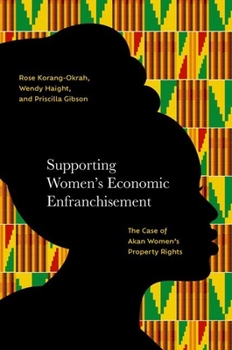Supporting Women's Economic Enfranchisement: The Case of Akan Women's Property Rights
This book addresses an international human rights issue: women's economic enfranchisement, specifically, their equal access to property using Akan widows from Ghana as a case study. The insidious effects of European colonialism contribute to the devaluation of Akan women beginning with gender roles imposed in childhood and continuing through inheritance practices that leave widows destitute. A close examination of Akan widows in their everyday, sociocultural contexts through ethnographic methods reveals the impact of property rights violations not only on the economic conditions of women and their children but also their psychosocial, spiritual, and moral well-being. Despite progressive national laws, many Akan widows lose access to the homes and farms they shared with their husbands, leaving them and their children destitute. According to customary law, those properties belong not to individuals, but to the husband's maternal family line of which his wife and children are not a part. Yet the Akan people are not without compassion, and Akan women without resilience. Some community leaders and in-laws do assist the widow and her children. In addition, some Akan widows do resist, persevere, and even thrive. Some gain peace through spiritual practices, and stability through innovative economic ventures with other widows and allies including international social workers. By deepening our understanding of the impact of property rights violations on women's lives as well as the ways in which some communities support them, and they actively resist such domination, we can extend the range of possible remedies to those who remain mired in challenges and in need of support.
Format:Hardcover
Language:English
ISBN:0197687962
ISBN13:9780197687963
Release Date:August 2025
Publisher:Oxford University Press
Length:160 Pages
Customer Reviews
0 rating





